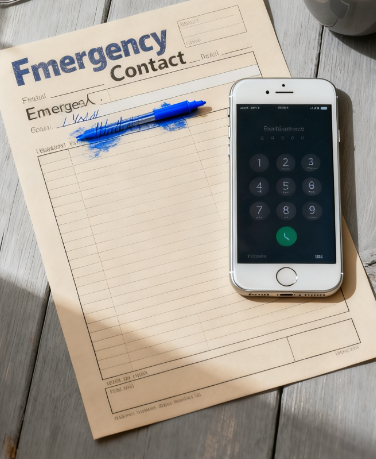
The discovery was an accident, a moment of bureaucratic necessity that turned into a private earthquake. You were at the clinic together, filling out the endless paperwork for a routine procedure. Your partner’s pen scratched across the page, and when the form was pushed back to the nurse, your eyes instinctively dropped to the “Emergency Contact” section.
You expected to see your name. After all, you were the spouse. You shared a home, a life, a bed. You were the one they’d call if the car broke down, the one who knew their coffee order by heart, the one who held them during thunderstorms.
But the name written there wasn’t yours.
It was “Arthur Lewis.” A name you’d only heard in passing, an old college friend who lived three states away.
The world didn’t stop. The fluorescent lights still hummed. The nurse still shuffled her papers. But for you, the ground shifted. It was a small, cold, administrative betrayal that felt more intimate than any argument. In the moment of ultimate crisis, the person they wanted by their side wasn’t you.
The rest of the appointment passed in a blur. You drove home in a silence you didn’t know how to break. The unspoken question hung in the air between you, heavy and suffocating: Why am I not enough?
That night, after a tense dinner, you couldn’t hold it in any longer. “I saw the form today,” you said, your voice carefully neutral. “At the clinic. You listed Arthur Lewis.”
Your partner didn’t look guilty. They looked… resigned. As if they’d been waiting for this conversation for a long, long time.
“It’s not what you think,” they said, their voice quiet. They went to the desk in the corner of the living room, opened a locked drawer you’d never pried into, and pulled out a small, worn, leather-bound journal. They handed it to you.
“My father had a massive heart attack when I was sixteen,” they began, a story they had only ever told you the barest outlines of. “My mom was his emergency contact. She was the one they called. She was the one who had to drive to the hospital, not knowing if he was alive or dead. She was the one the doctors looked in the eye when they said there was nothing they could do.”
They took a shaky breath. “I found her in the parking lot afterward. She was just… screaming. Hitting the steering wheel. It broke her. She was never the same person again.”
They looked at you, their eyes filled with a profound, aching love. “You are my heart. You are my entire world. The thought of you receiving that call… of you having to carry that weight, that specific, soul-crushing terror… I can’t. I won’t do that to you.”
Arthur Lewis wasn’t a replacement. He was a shield.
He was the friend from a lifetime ago, the one who had already seen them through the worst loss of their youth. He was the designated bearer of bad news, the one who would stand as a buffer between you and the initial, shattering blow. He would be the one to fly in, to handle the brutal, immediate logistics, to be the strong one in the waiting room, so that when you arrived, the crisis would be managed, and you could simply be there to hold their hand, to be their spouse, not their first responder.
The emergency contact on their medical forms isn’t you, but it is the ultimate act of love. It is a desperate, flawed, and deeply human strategy to protect the person they cherish most from a pain they themselves have witnessed and fear more than their own mortality. They haven’t chosen someone else over you. They have chosen to carry the potential of that devastating moment on their own shoulders, so that yours remain free to hold them, to love them, and to remain unbroken, no matter what the future holds. It is not a rejection. It is the most fierce and tragic form of devotion.